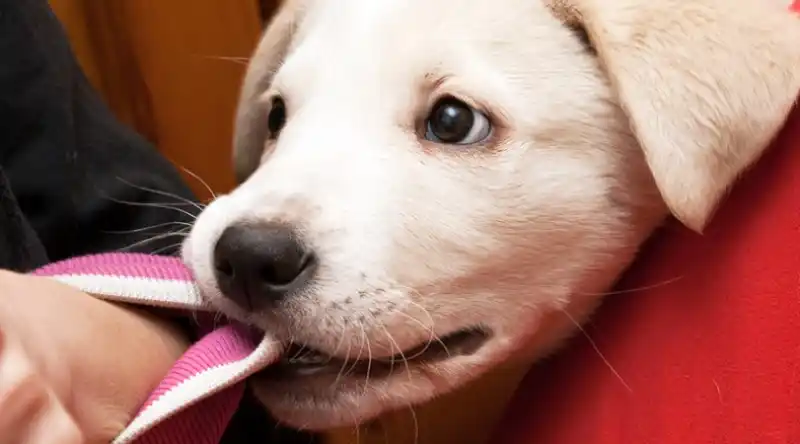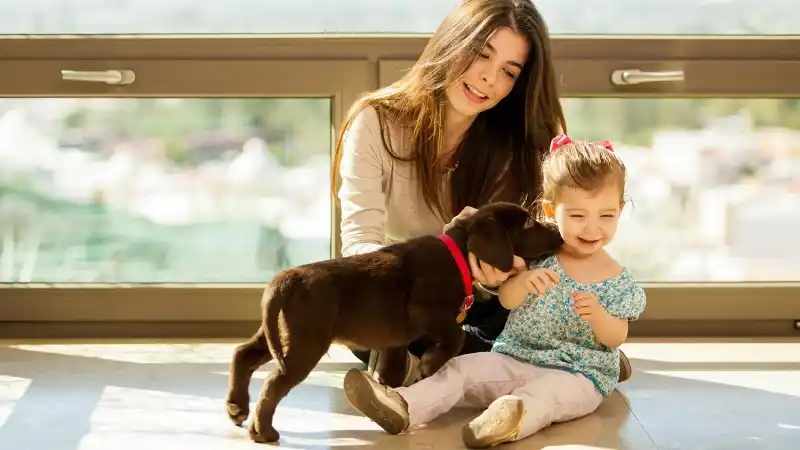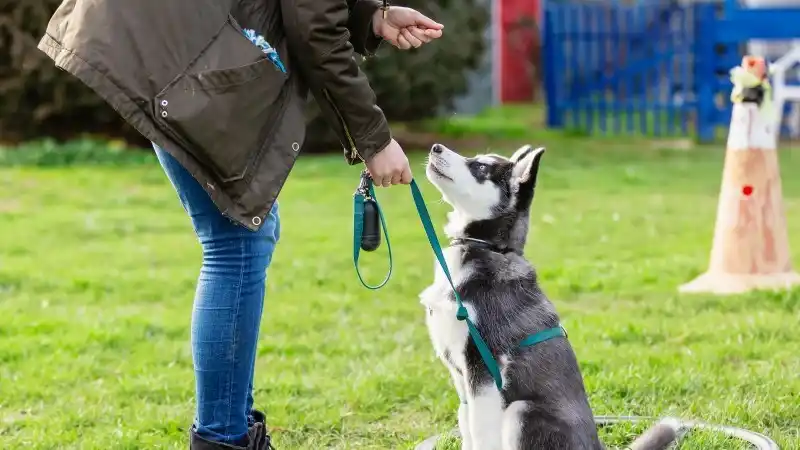Raising a Service Dog Puppy
Training service puppies requires more care and attention than training an average family dog. Discover what it takes to raise a puppy to be a service dog.
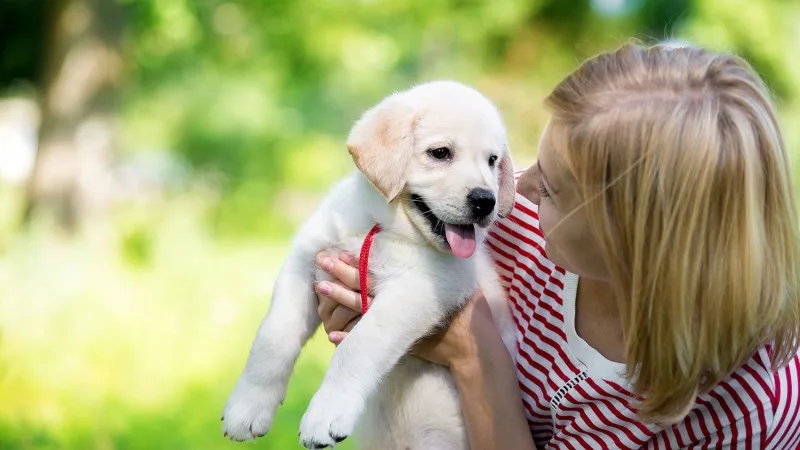
There are dozens of service dog organizations in the United States. According to the American with Disabilities Act (ADA), a service dog is, “Individually trained to do work or perform tasks for a person with a disability.”
Of course, a lot goes into transforming a rambunctious puppy into a reliable companion animal capable of serving an owner in need. You can learn to train a dog to be a service dog here, and learn the basics about guide dogs, psychiatric service dogs, and emotional support animals in the following article: Service Dogs, Working Dogs, Therapy Dogs, Emotional Support Dogs: What’s the Difference?
Service dog organizations utilize volunteers to raise their puppy pupils for approximately the first 12 - 14 months of their lives. Some of these organizations evaluate each individual dog’s training and progress within the program, while others do the evaluation at the end of the puppy's time with their handler or trainer.
After a new puppy graduates from their first home, they will go back to formal service dog training at a more advanced facility that focuses on the finer points of their particular type of service. For example, beyond sit, stay, heel, and other basic obedience commands, some trainees may learn specific tasks like fetching shoes for a companion with a physical disability, while others learn how to act as alert dogs when their companion is about to have a seizure.
According to Canine Companions for Independence (CCI), puppy raisers “provide specially-bred puppies a safe home, take them to obedience classes, serve up a healthy diet, provide socialization opportunities, and give lots of love.”
May, of Bluffton, South Carolina, has raised 14 puppies for CCI since 2002. Six graduated, seven potential service animals decided they would rather be pets (by “opting out” of the program), and one is currently in advanced training!
May is taking a temporary break from raising puppies because she was partnered with a hearing dog, Huxley, last year. She is teaching three-year-old Huxley to alert her to various sounds, such as smoke detectors and the sound of a ringing doorbell, as well as how to respond when a companion in need drops something. We spoke with May and got additional insight into what it takes to be a puppy raiser:
If you're raising a service puppy, are you allowed to have any other pets?
For CCI, you may have other pet-friendly pets, as long as the puppy is the only dog under the age of one in the household. Each organization has different guidelines, but if you have existing pet dogs who are friendly, you will likely be able to find an organization for which you can raise puppies to eventually become of service.
Do volunteer puppy raisers have to do any special schooling or receive certification before being approved?
CCI provides a manual and support via phone, email, or in-person. The CCI volunteer community also communicates to support each other and provide suggestions to one another, especially newcomers to the program. Other organizations will have different requirements depending on their size and locations— some organizations will have puppy raisers attend weekly group classes before getting their first puppy. They will then bring their assigned puppy to those same class locations after the puppy is delivered to them.
Where are you allowed to take your puppy while in training?
The puppies, depending on which state you live in, will typically have the same public access rights as service dogs. You need to check this out for your state. Otherwise, we will ask permission in advance from the management before just showing up with pups. We just turned in puppy number 14, so many of the places we visit regularly are already familiar with us, and are accustomed to having us and our canines in and around their businesses.
What is the most rewarding part of puppy raising?
There are so many different levels! I would say the ability to educate others about what a service dog might do for those who need them. Puppy raising also helps teach both children and adults that not all dogs are mean or vicious. And, of course, raising a pup that will eventually graduate and help others is a tremendously rewarding experience in and of itself!
What kind of work do you do with puppies to prepare them for their next level of education?
We need to teach the puppy how to act in public places. This is really no different than helping a child understand what is appropriate behavior outside of the home. We teach the puppies how to properly behave in settings where there are people they do not know—we're responsible for teaching them not to run or bark, and not to eat off the floor!
Also, it is our job to ensure that all pups are completely housetrained before they move on to their higher education programs. It may sound incredibly basic, but knowing when and where it is appropriate to go potty is one of the most important basic training steps a pup can complete.
What types of reports or tests do you have to do with your puppy during the raising period?
While raising, we have to fill out a monthly progress report on how the pup is doing. We list any issues that we encountered that month, we list the places we went, and the temperament the puppy displayed in various different settings. The trainers reading the reports will be able to signal potential issues and also get to know the puppy before they are turned over for the more advanced program.
What surprised you the most when you got your first puppy home and started working with them?
Our first puppy came to us back in 2002. The first thing I recall is that Hadlee was not sleeping through the night. Luckily, my daughter took care of this, and after about three weeks, our nightlife returned to normal, presumably because Hadlee had become accustomed to her new surroundings and was finally comfortable. Also, the fact that a puppy could get into so much mischief while under our watch was astonishing to our whole family!
What do you see as the most important aspect of raising a puppy in preparation to become a service or support dog?
The goal was getting them to act appropriately in public! This often meant helping puppy trainees understand that staying in a down position at busy places or in an environment where things were somewhat hectic is how they can be most helpful. Helping dogs understand their role as a service animal often means helping them comprehend that right now is not the time to play. The pups had to learn to accept that just because there was a bird, duck, squirrel, leaf, or ball that this very minute is not the time to play with these things because they are technically at work!
The hardest part of puppy raising must be forming a meaningful bond and then giving the dog to the organization for the next phase of training. How do you prepare yourself and the pup for that?
There is no way that you cannot form a bond with the puppies you work with. While they are in your care and learning from you, a puppy is your commitment 24/7. The way we looked at it, there were two or three positive options. First, we have a graduate. Second, the puppy doesn’t graduate, and we adopt the dog. Or, third, the puppy doesn’t graduate, but we cannot take the pup, so we have close friends who sign up to adopt the puppy. In all cases, but not always, we will know where the pup is and will hope to have contact—this has been the case for the seven that did not graduate. We adopted #2 and #6!
What type of people make the best puppy raisers?
I have seen many different types of people who are puppy raisers—and they vary quite a lot! Many work full-time, some work part-time, some are full-time students, and some are even retired. Some are highly athletic, many do a lot of road trips, and some don’t do much traveling at all. Having children is a bonus, because it can help young pups learn how to be around small people. The same is also true for having other pets in the home where the training will occur.
What will happen when the dog goes back to the training facility for their formal training?
When the dog is returned for the advanced training session, it will be placed in a kennel with a dog of the same sex. The dogs don’t have water bowls, so they must learn to drink from a ball drip, similar to the water container in a hamster cage.
The dogs are put into groups (these are referred to as “strings”) with a service dog trainer, and they will work with the trainer for the next six months, often switching to another trainer after a three-month period. In addition to this, dogs at this stage go through extensive medical testing within the first two weeks to see if there are any medical conditions that need to be addressed before moving forward.
If any issues do arise, the dog can be released from the program. Many dogs do not deal well with being kenneled (in a kennel facility) or have separation anxiety that is not responsive to obedience training. Those that display these types of behavioral health issues may also be released.
We had two canines released before they were even turned in for advanced training—one due to fear aggression and the other due to fear of floor textures. If the organization finds that the pup might have a potential medical issue later in life, such as something detected in their physicals, then those puppies could be released too. We also had a Golden Retriever that was not food motivated (she did not respond to training that made use of food or treats as a motivator to learn new things)—she was released as well.
If the dogs do pass the medical testing, then the trainer starts reinforcing the commands taught to the dogs by the puppy raisers, then bumps up the difficulty a step or two. Trainers send monthly progress reports to the puppy raisers the fourth Wednesday of the month to let them know what the dogs are learning and how well the dogs are doing with their new and more advanced education. The dogs are also assessed on how they play and how well they get along with others in their training groups (strings). For example, do they whine, bark, or hump?
If all goes well and the dogs manage to stay in for six months, then they are placed into the next rotation for becoming a service animal. Many are not ready for the next level, but the organization has the dogs rotate through the training program to give them the ability to work with the potential graduates. Those that are not able to fully follow through on their commands will not be placed. Instead, they will return to the kennels for another three months of training.
And finally, if canine students are not placed after nine months of training, they will be released from the program.
If someone is interested in becoming a puppy raiser, what should they do?
When my daughter started us on this journey, she researched quite a few organizations and found this to be the best match for what she wanted as an outcome. Since then, we have encountered other service animal raising groups that are quite different in many ways. When searching for an organization, think about what you want to get out of it—my family wanted to know where the graduating dog went. Although the person receiving the graduate does not have to keep in contact, we are in contact with all of our grads. CCI also gave us a strong support group.
And, the good news is, if you don’t want to be a puppy raiser, or if for whatever reason you are unable to be, there are so many other ways to volunteer and help the organizations that give so much to ensure people get the service animals they need!
What else should people know about service dog puppy training?
A service dog is NOT a pet. It’s not something that you get and then ignore. It’s not a highly trained dog that will be able to go through life without constant training and reinforcement from you. Working with a puppy in training is an ongoing commitment that requires stamina and patience. These dogs are deemed medical equipment—the same as a wheelchair, crutches, or a cane—and you don’t pet those items, so don’t pet a service dog.
The dog is our responsibility, not the responsibility of any place that we visit. If you’d like to pet a service dog, please, always ask first. You may be permitted to, but most likely—because the dog is in a working mode—you will not be able to. So, it is important for people in everyday circumstances to understand the boundaries of a service animal and why they exist in the first place.
A Serious Commitment Requiring Patience
May shares a lot of wonderful inside tips about raising pups to be trained service dogs for those who have questions about what it takes. Keep in mind that what she says is true and so important: raising these animals is a full-time and ongoing commitment, and it requires that you create a bond with an animal, despite having to say goodbye when the time comes. But, if you have what it takes, and you feel you are ready to volunteer to train service dogs and give of yourself in this manner, it is undoubtedly one of the most rewarding types of volunteer work you will ever engage in.
Take some of the stress out of pet ownership with Accident & Illness Coverage from AKC Pet Insurance (underwritten by Independence American Insurance Company). Our pet insurance plans are designed to be there when you need them, allowing you to focus more on the health of your pet and less on costly veterinary bills.
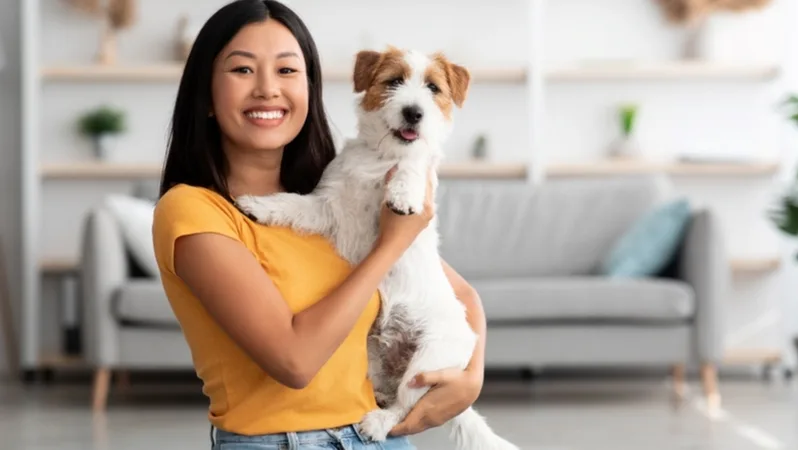
Every Dog and Cat Deserves the Pet Insurance of Champions
Get prize-winning care for your pets.
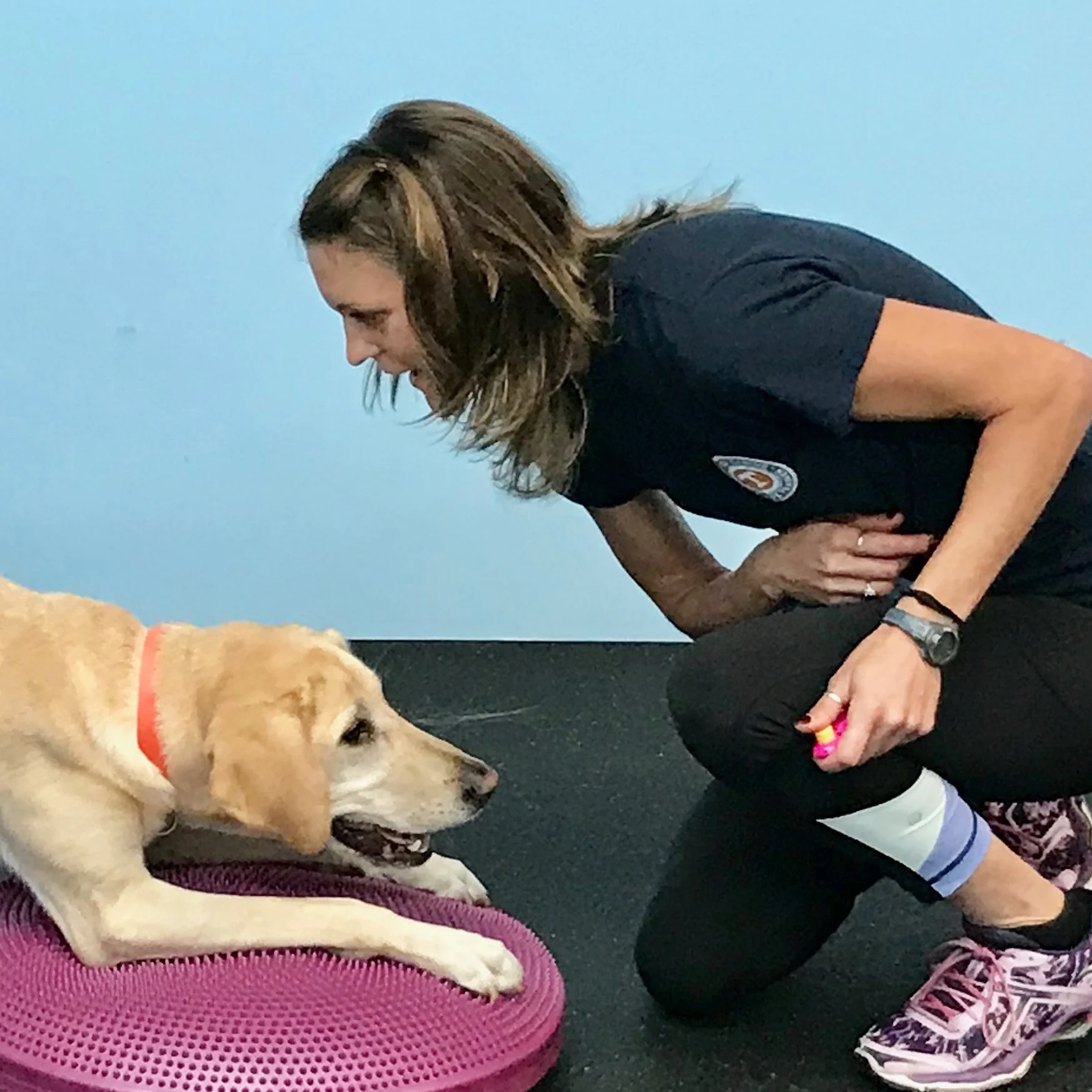
Jasey Day holds the Certified Canine Fitness Trainer (CCFT) credential through the University of Tennessee. She is a member of the Bobbie Lyons K9FITteam - a team of compassionate canine fitness instructors who actively teach others and continually expand their own knowledge. Since 2004, Jasey has taught a variety of workshops and classes on the following: Puppy, Canine Good Citizen/Family Pet, Advanced Family Pet, Canine Fitness, Canine Swimming, Rally, and Agility. In addition, Jasey has earned over 60 titles in Dock Diving, Agility, Rally, CGC and Trick Dog. Jasey has worked full time for the American Kennel Club since 2007 and teaches at Care First Animal Hospital in Raleigh, NC. Jasey’s Labrador Retrievers spend their free time hiking, training, and snuggling with Jasey.
READ MORE ARTICLES